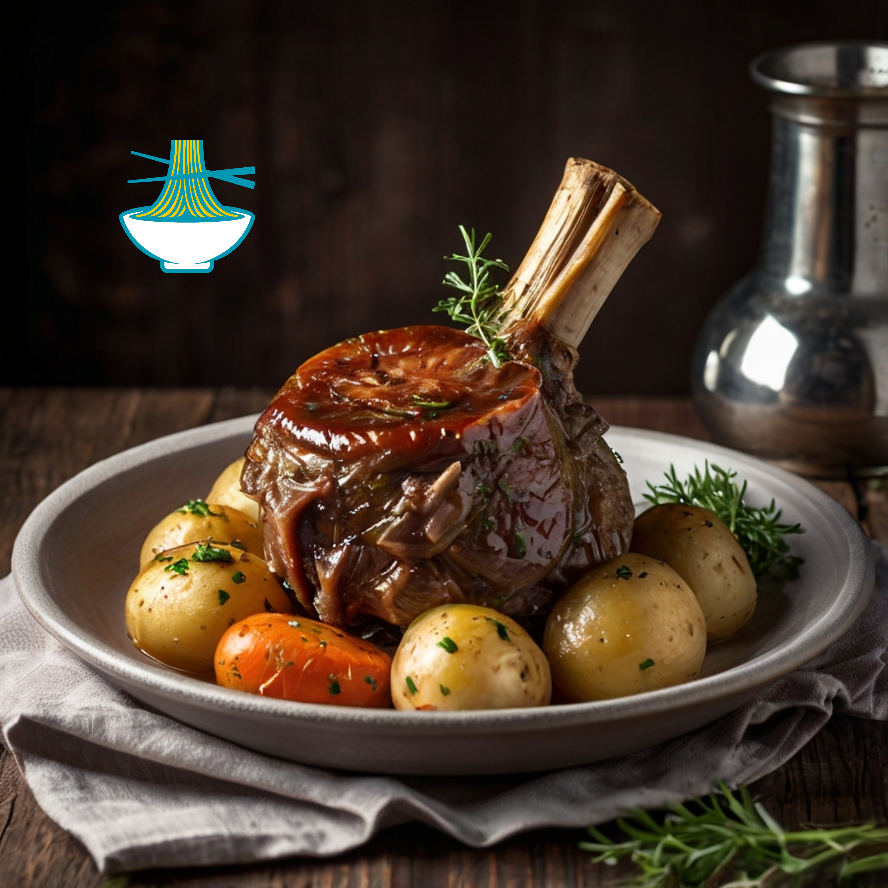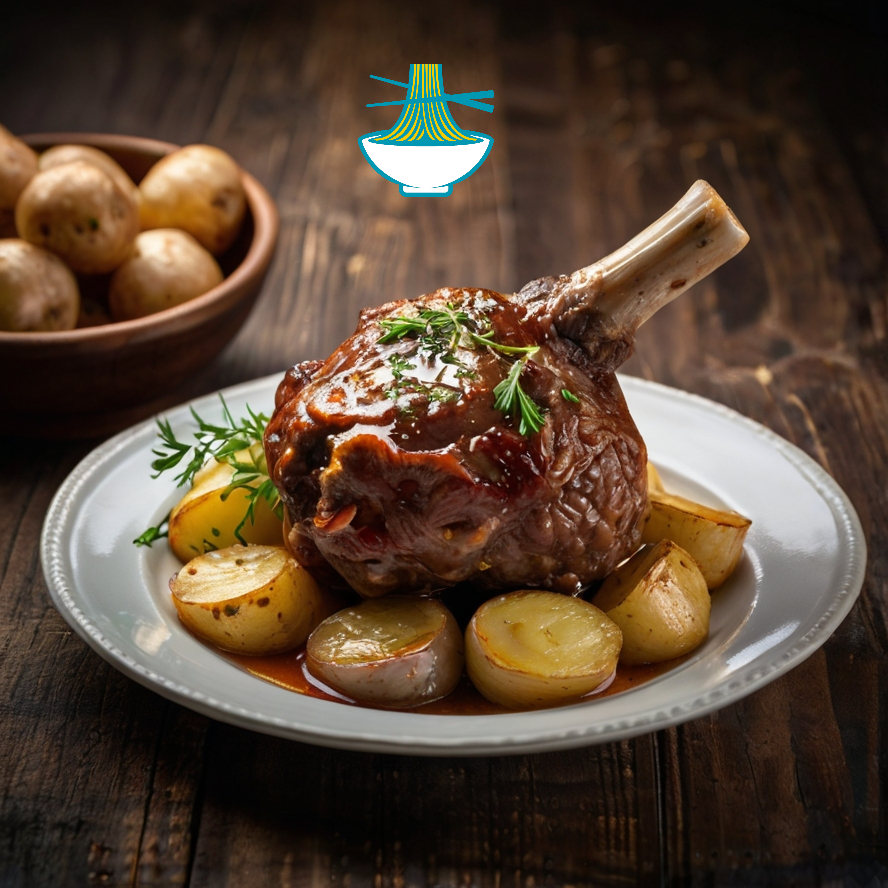Discover the perfect recipe for succulent mutton shanks, slow-cooked or boiled to perfection. This dish features tender mutton shanks simmered with potatoes and vegetables, creating a hearty and flavorful meal. Ideal for a comforting family dinner, this recipe offers a step-by-step guide to achieving tender meat with a rich, savory broth. Learn how to make this delicious mutton shank dish that’s perfect for any occasion.
Ingredients:
- 4 mutton shanks
- 4 large potatoes, peeled and cut into chunks
- 2 carrots, peeled and sliced
- 1 onion, chopped
- 3 cloves garlic, minced
- 1 cup beef or chicken broth
- 1 cup water
- 2 tablespoons vegetable oil
- 1 teaspoon ground cumin
- 1 teaspoon ground coriander
- 1 teaspoon paprika
- 1/2 teaspoon turmeric
- 1 teaspoon dried thyme
- Salt and black pepper to taste
- Fresh parsley for garnish
Instructions:
Prepare the Mutton Shanks: Pat the mutton shanks dry with paper towels. Season with salt, black pepper, cumin, coriander, paprika, and turmeric.
Sear the Meat: Heat the vegetable oil in a large pot or Dutch oven over medium-high heat. Add the mutton shanks and sear on all sides until browned. Remove the shanks from the pot and set aside.
Sauté the Vegetables: In the same pot, add the chopped onion and cook until translucent. Add the minced garlic and cook for an additional 1 minute until fragrant.
Deglaze the Pot: Pour in the beef or chicken broth and water, scraping the bottom of the pot to release any browned bits. Return the mutton shanks to the pot.
Add Potatoes and Carrots: Place the potatoes and carrots around the mutton shanks. Sprinkle with dried thyme and adjust seasoning with salt and pepper.
Cook the Dish: Cover the pot and reduce the heat to low. Simmer for 2 to 3 hours, or until the mutton shanks are tender and the meat easily falls off the bone. Alternatively, cook in a slow cooker on low for 6 to 8 hours.
Serve: Garnish with fresh parsley before serving. Enjoy the mutton shanks with the flavorful broth, potatoes, and vegetables.
This recipe yields a comforting, savory dish that's perfect for any occasion, bringing together tender mutton shanks with hearty vegetables in a rich, flavorful broth.
Nutritional Value
Mutton Shanks
- Calories: 250
- Protein: 20g
- Fat: 20g
- Carbohydrates: 0g
Benefits: High in protein and essential nutrients like iron, zinc, and B vitamins. Mutton is also rich in healthy fats, which can be beneficial for energy and cell function.
Potatoes (4 large)
- Calories: 77
- Protein: 2g
- Fat: 0.1g
- Carbohydrates: 17g
- Fiber: 2.2g
Benefits: Rich in carbohydrates for energy, vitamins C and B6, potassium, and dietary fiber. Potatoes support digestive health and are a good source of antioxidants.
Carrots (2)
- Calories: 41
- Protein: 0.9g
- Fat: 0.2g
- Carbohydrates: 10g
- Fiber: 2.8g
Benefits: High in beta-carotene (which converts to vitamin A), carrots support vision health, skin health, and have antioxidant properties.
Onion (1)
- Calories: 40
- Protein: 1.1g
- Fat: 0.1g
- Carbohydrates: 9g
- Fiber: 1.7g
Benefits: Rich in antioxidants and sulfur compounds, onions can support heart health, have anti-inflammatory properties, and help with digestion.
Garlic (3 cloves)
- Calories: 149
- Protein: 6.4g
- Fat: 0.5g
- Carbohydrates: 33g
- Fiber: 2.1g
Benefits: Known for its antibacterial, antiviral, and anti-inflammatory properties. Garlic supports immune function and heart health.
Beef or Chicken Broth (1 cup)
- Beef Broth: 40-50 calories, 4g protein, 1g fat
- Chicken Broth: 30-40 calories, 3g protein, 1g fat
Benefits: Provides flavor and additional nutrients like vitamins and minerals. Chicken broth is particularly good for its potential immune-boosting properties.
Water (1 cup)
- Nutritional Value: 0 calories
Benefits: Essential for hydration, supports bodily functions, and helps in the digestion and absorption of nutrients.
Vegetable Oil (2 tablespoons)
- Calories: 120
- Fat: 14g
- Saturated Fat: 1g
Benefits: Provides healthy fats, which are necessary for hormone production and cell health. Choosing oils high in unsaturated fats, like olive or canola oil, is beneficial.
Ground Cumin (1 teaspoon)
- Calories: 8
- Protein: 0.4g
- Fat: 0.4g
- Carbohydrates: 1g
Benefits: Contains antioxidants and has anti-inflammatory properties. Cumin aids digestion and boosts the immune system.
Ground Coriander (1 teaspoon)
- Calories: 5
- Protein: 0.2g
- Fat: 0.2g
- Carbohydrates: 1g
Benefits: Rich in antioxidants and has anti-inflammatory properties. Coriander can support digestion and help control blood sugar levels.
Paprika (1 teaspoon)
- Calories: 6
- Protein: 0.3g
- Fat: 0.3g
- Carbohydrates: 1g
Benefits: Contains vitamins A and E, which have antioxidant properties. Paprika can help boost metabolism and support eye health.
Turmeric (1/2 teaspoon)
- Calories: 8
- Protein: 0.3g
- Fat: 0.2g
- Carbohydrates: 1.5g
Benefits: Contains curcumin, known for its anti-inflammatory and antioxidant effects. Turmeric supports joint health and may help in reducing the risk of chronic diseases.
Dried Thyme (1 teaspoon)
- Calories: 3
- Protein: 0.1g
- Fat: 0.1g
- Carbohydrates: 0.6g
Benefits: Rich in antioxidants and has antimicrobial properties. Thyme supports respiratory health and aids in digestion.
Salt and Black Pepper
- Salt: Adds flavor but excessive consumption can lead to high blood pressure.
Black Pepper:
- Nutritional Value (per teaspoon): 6 calories, 0.2g protein, 0.2g fat, 1.5g carbohydrates.
Benefits: Contains piperine, which may enhance nutrient absorption and has anti-inflammatory.
Fresh Parsley (for garnish)
- Calories: 36
- Protein: 3g
- Fat: 0.8g
- Carbohydrates: 6g
Benefits: Rich in vitamins A, C, and K. Parsley supports immune health, has antioxidant properties, and can aid in digestion.


Comments